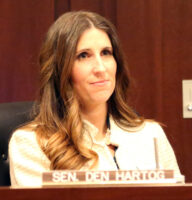Protecting small, rural districts and giving school leaders flexibility with spending decisions were two themes from a crowded hearing on school funding Thursday night in Boise.
More than 60 people turned out for the first public hearing of the Legislature’s school funding formula committee.
Now in its third year of work, the committee is charged with updating and modernizing Idaho’s complicated school funding formula, which hasn’t been rewritten since 1994.
Teresa Fabricius, superintendent of the Fruitland School District, asked the committee to give districts as much spending flexibility as possible and to dump the “use-it-or-lose-it” funding component connected to the current formula.
Fabricius said Fruitland’s priorities — and therefore funding needs — change from year to year. One year, she might need extra technology funding to repair a room full of computers. The next year, she may see a spike in special-needs students or English language learners, necessitating extra money for training, or to hire paraprofessionals or aides.
Fabricius worried that a rigid formula won’t be nimble enough to respond to those needs.
“Only we can know what is needed in our district,” Fabricius said.
Sen. Lori Den Hartog, a Meridian Republican who serves on the funding formula committee, said lawmakers are looking at rewriting the formula during the 2019 legislative session. But she said it’s important not to spring massive changes on schools. So Den Hartog favors an 18-month transition, meaning the new formula would not hit the books until the 2020-21 school year.

She also said lawmakers want to fulfill their five-year commitment to raise teacher pay through the career ladder law, a goal they could meet next year.
“We want to make sure, as an interim committee, that we had the career ladder fully funded before we change anything with the public school funding formula,” Den Hartog said.
The committee kicked off three weeks of meetings Wednesday with an invitation-only, closed-door focus group meeting involving school officials and paid consultants from Education Commission on the States.
Altogether, 15 private focus group meetings and six public forums are on the schedule.
The public, the 10 legislators on the funding formula committee, Superintendent of Public Instruction Sherri Ybarra, State Department of Education staff and the news media are barred from attending the private focus group meetings.
Although she could not participate in the private focus groups, Ybarra attended the entire public hearing Thursday, and said she was pleased to see a variety of school districts and charters represented.
“The one thing I was pleased at hearing is the same theme I’ve heard since I took office, which is more flexibility, and you heard that from the small districts and the large districts,” Ybarra said.
Michael Griffith, a senior consultant with ECS, said the private meetings were scheduled to promote a free-flowing atmosphere where everyone would feel comfortable speaking. For example, he said it was important to allow a teacher to speak without fear of negative comments getting back to her local superintendent or the state superintendent’s office.
Following the public and private meetings, the committee will reconvene July 18 to review feedback and vote on recommendations from ECS.
Griffith said ECS has worked with at least 20 other states on school funding issues, but has never seen a committee make it a priority to make its final recommendations during a public hearing, as Idaho lawmakers expect to do in July.
“I’ve never actually done it where we fully create the funding formula in public, so it’s kinda scary for me, but a great opportunity for you to go in and see the decision being made,” Griffith said.
Last year, the committee backed the concept of dumping the current, complicated formula based on average daily attendance in favor of a student-centered model based on enrollment.
This year the committee is working to refine this recommendation and attach details. One option that appears to have some support would be providing a certain dollar amount per student for budgeting purposes, and then adding funding for special-needs students and rural districts.
Those in attendance Thursday included Ybarra, Reps. Thomas Dayley, R-Boise, and Ryan Kerby, R-New Plymouth; Marilyn Whitney, Gov. Butch Otter’s education liaison; Idaho Education Association President Kari Overall; Idaho Business for Education CEO Rod Gramer; Idaho Association of School Administrators Executive Director Rob Winslow and many teachers.
Anyone who cannot attend a public hearing can share concerns or suggestions by sending an e-mail to [email protected].
A school funding survey is also available to take online. Feedback will be accepted through the survey until June 30.
Remaining school funding hearing schedule, at a glance
Monday: Private, invitation only meetings by day; public forum, 5 to 7 p.m., Shoshone Bannock Hotel Events Center, 777 Bannock Trail, Fort Hall.
Tuesday: Private, invitation-only meetings by day in Fort Hall; public forum, 5 to 7 p.m., Taylorview Middle School, 350 Castlerock Lane, Idaho Falls.
Wednesday: Private, invitation-only meetings by day; public forum, 5 to 7 p.m. Red Lion Hotel, 1357 Blue Lakes Blvd., Twin Falls.
June 19: Private, invitation-only meetings by day; public forum, 5 to 7 p.m., Coeur d’Alene Resort, 115 S. Second St., Coeur d’Alene.
June: 20: Private, invitation-only meetings by day; public forum, 5 to 7 p.m., Red Lion Hotel, 621 21st St., Lewiston.
